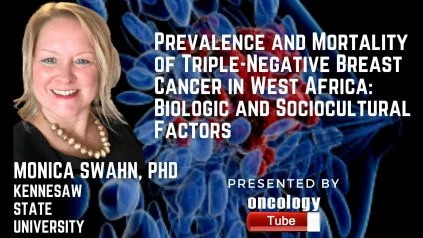Monica Swahn, Ph.D. from the International Consortium for Advancing Research on Triple-Negative Breast Cancer, Department of Population Health Sciences, Georgia State University speaks about Prevalence and Mortality of Triple-Negative Breast Cancer in West Africa: Biologic and Sociocultural Factors.
Link to Article:
https://ascopubs.org/doi/10.1200/GO.21.00082?url_ver=Z39.88-2003&rfr_id=ori:rid:crossref.org&rfr_dat=cr_pub%20%200pubmed
Africa is the world’s second-most populous continent. The continent has considerable physical, cultural, and population variety, with 54 nations spread over five geographical areas (Northern, Western, Middle, Eastern, and Southern Africa). Breast cancer (BC) has a wide range of incidence among African people. BC has become a major public health issue across the world. BC is the second-leading cause of cancer mortality and the most prevalent cancer type among women globally, according to the Global Cancer Observatory, affecting 24 percent of all women (approximately 2.1 million cases in 2018). 2 Despite its low prevalence (Fig 1), BC is on the rise in Africa, particularly in Sub-Saharan Africa (SSA). 3,4 In SSA, the BC burden in 2030 is expected to be double that in 2012. 4 SSA includes a number of low- and middle-income countries (LMICs) with low GDP per capita and a low human development index; many of these nations are located in West Africa (WA).
The main goal
TNBC is malignant breast cancer that lacks targeted therapy and would benefit from more study to better understand its etiology and the reported variance in malignancy amongst women of different ancestries. This large-scale systematic literature review looks at the existing and developing biologic and nonbiologic variables that have been found to impact TNBC disease outcomes in indigenous West African (WA) females, as well as some potential actions that health care systems might take to reduce the burden.
Knowledge Produced
Women in Western Australia are the most affected by TNBC. TNBC illness outcomes have been found to be influenced by biological and economic variables. In WA nations, women’s education efforts, specialised training, and accessible health care are all needed.
Relevance
The identification of WA-specific biologic, cultural, and socioeconomic TNBC variables may help to coordinate efforts in the development of treatment choices and physician advice for cancer-stricken women.

